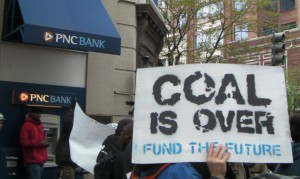 I hold no illusions about how much political power in the U.S. lies in corporate hands. That’s why, a few years ago, I started to acquire a portfolio of shares in a number of banking and energy companies. As a shareholder, I’m entitled to one opportunity each year to question CEOs and senior executives about their company’s behavior and responsibilities. (This is far better access than I have to my Congresswoman, who always delegates her assistants and interns to attend constituent meetings.)
I hold no illusions about how much political power in the U.S. lies in corporate hands. That’s why, a few years ago, I started to acquire a portfolio of shares in a number of banking and energy companies. As a shareholder, I’m entitled to one opportunity each year to question CEOs and senior executives about their company’s behavior and responsibilities. (This is far better access than I have to my Congresswoman, who always delegates her assistants and interns to attend constituent meetings.)
This morning I attended PNC bank’s shareholder meeting. I tend to find these events extremely self-congratulating, and today was no exception. We were treated to announcements about how (relatively) well the bank has been performing financially and the titles and awards that the bank has received this year, all before a video extolling PNC’s core values.
Two of those values stood out to me: “Commitment to community” and “Quality of life”. This was exactly what I came to talk about. When my opportunity came, I stepped up to the mic to introduce myself as a shareholder and explain RAN’s campaign for PNC to end their financing of mountaintop removal (MTR) coal mining. I asked CEO James Rohr to report on the impacts of the bank’s 2010 policy on MTR, and I introduced my friend, Amber Whittington, who accompanied me to the meeting.
 Amber is 21 and lives in the belly of the Coal River Valley, West Virginia, next to Kayford mountain and in between two MTR mines: one operated by Massey Energy, the other by Patriot Coal. Amber spoke to the meeting about the impacts these mines have on her daily life, about how her tapwater runs orange due to the toxic heavy metals that leech from the neighboring mines, and about how she has to drive 45 minutes to obtain clean and safe drinking water from the town of Beckley.
Amber is 21 and lives in the belly of the Coal River Valley, West Virginia, next to Kayford mountain and in between two MTR mines: one operated by Massey Energy, the other by Patriot Coal. Amber spoke to the meeting about the impacts these mines have on her daily life, about how her tapwater runs orange due to the toxic heavy metals that leech from the neighboring mines, and about how she has to drive 45 minutes to obtain clean and safe drinking water from the town of Beckley.
So how did James Rohr respond to this? He replied that he considers himself and PNC to be “green,” and to demonstrate this green-ness he referenced the LEED Platinum PNC offices that this meeting was taking place in. He told us that PNC had “significantly reduced its exposure to MTR,” that the bank “no longer provided finance for MTR projects” or for “companies who primarily practice MTR extraction,” but that there were still some companies PNC had dealings with who practice a limited amount of MTR. His justification for financing these companies is the jobs these companies provide.
The next shareholder to speak introduced herself as a quaker and listed the reasons that she too is concerned about PNC and MTR, before urging the bank to adopt a full-sector exclusion. Mr Rohr responded by acknowledging the bank’s deep historical connections to the quaker movement. Another shareholder, a school teacher, praised PNC’s flagship headstart educational program and requested this support be extended to Appalachian childhood — by fully getting out of MTR.
In less than one hour the meeting was over, and a small crowd of shareholders gathered around Amber to express support for her. She and I were then invited to meet with a senior executive to continue our conversation, where we challenged the myth of MTR “job-creation” and advocated that PNC shift financing to support renewable energy development in Appalachia, to create the types of jobs that young people in Appalachia like Amber actually want the opportunity to do.
My impression was that PNC was keen to listen, I’m hoping that enthusiasm translates into action.












